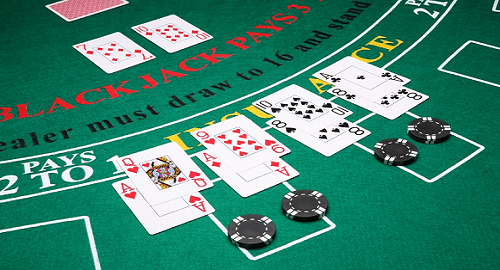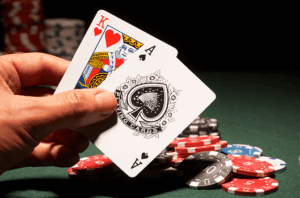Steve Buck | February 17, 2023 | Updated on: March 22nd, 2023
If you are looking to learn how to play blackjack, there are a few key things to keep in mind. First, it’s important to understand the value of each card and the basic objective of the game. You also have to keep in mind that blackjack is a game of strategy, skill, and luck.
Blackjack is a classic casino game that millions of players have enjoyed for decades. This card game is also known as 21, as the game’s objective is to have a hand value of 21.
In this guide, you will learn how the game is played, learn blackjack game variants, and learn the basic strategy of the game of blackjack.
Best Blackjack Sites in Australia 2023
How to Play Blackjack Step by Step
As stated, the game’s objective is to beat the dealer by having a hand value of 21 or close to 21 without Exceeding. Blackjack can be played with one to seven players, but the game is usually played with one to six players.
Blackjack is played with a standard deck of 52 cards. The cards 2 to 10 have their face value. This means that a two is worth two points, a three is worth three points, and so on.
Face cards (jacks, queens, and kings) are worth 10 points. Aces are worth either 1 or 11 points, depending on which value would be more advantageous for the player.

Here is how the game is played:
1. Betting
Betting is an essential aspect of the game and takes place before the cards are dealt. Each player places a bet in a designated area in front of them.
2. The Deal
Once all players have placed their bets, the dealer will deal two cards to each player and two to themselves. One of the dealer’s cards is dealt face up, while the other is facedown, also known as the “hole” card.
3. The Play
Based on the value of their hand, players can make a number of decisions, including:
Stand: If the player is satisfied with their hand value, they can stand and keep their hand as it is.
Hit: If the player feels they need to improve their hand, they can choose to hit and take another card. Players can continue to hit until they either choose to stand or their hand value exceeds 21, “bust”, and lose the round.
Double down: If the player is confident in their hand, they can choose to double their bet and take one more card. After taking the additional card, the player must stand.
Split: If the player’s first two cards are of equal value, they can split them into two separate hands and place an additional bet equal to their original bet. The dealer will then deal a second card to each split hand, and the player will play each hand separately.
4. The Dealer’s Play
Once all players have made their decisions, the dealer will reveal their hole card and play their hand according to a set of rules. The dealer must hit until they have a hand value of at least 17 and stand when their hand value is 17 or higher.
5. Determine the winner
If the player’s hand value exceeds 21, they “bust” and lose their bet. If the dealer busts, all remaining players win. If neither the player nor the dealer busts, the hand with the highest value closest to 21 wins.
Blackjack Rules
Learning how to play blackjack entails having a good grasp of the game rules. However, the rules of blackjack can vary slightly from one casino to another.
Understanding the basic rules of blackjack is essential to having a fun and successful time at the casino.
- Players have to place their bets before cards are dealt.
- If the player busts or their hand value is lower than the dealer’s, the player loses their wager.
- If the player’s hand value is closer to 21 than the dealer’s hand value, the player wins.
- If the dealer busts, the player wins.
- If the player wins, they are paid 1:1 of their bet.
- If the dealer’s face-up card is an Ace, players may choose to make an insurance bet, which pays out 2:1 if the dealer has a blackjack. Not all blackjack games have insurance bets.
Our Top Blackjack Strategy Tips
Now that you know how to play blackjack, you have probably realized that it is a game of chance and skill. It is thus essential to note that no strategy can guarantee a win. However, players can reduce the house edge and increase their chances of coming out ahead in the long run by following the below guidelines:
Here are some of the basic strategies in blackjack:
How to Play a Hard Hand (A hand without an Ace):
- When your hand value is between 4 and 8, you must always hit.
- If your hand value is 9, you have two options:
- Double down if the dealer’s hand value is between 2 and 6.
- Hit if the dealer’s hand value is between 7 and 11.
- If your hand value is 10 or 11, double down if the dealer’s hand value is lower. If not, hit.
- If your hand value is between 12 and 16, you have two options:
- Stand when the dealer’s hand value is less than 6.
- Hit if the dealer’s hand value is above 6.
- If your hand value is 17 or higher, always stand.
How to Play a Soft Hand:
- When your hand value is between 13 and 15, always hit.
- If your hand value is between 16 and 18, you have two options:
- Double down if the dealer’s face-up card is less than 7.
- Hit if the dealer’s hand value is between 7 and 11.
- If your hand value is 19 or higher, always stand.
Playing a Pair Hand:
- If you are dealt a pair of 2s, 3s, 6s, 7s, or 9s:
- Split if the dealer’s hand value is 6 or less.
- Hit if the dealer’s hand value is above 6 and your pair value is less than 17.
- Stand when the dealer’s hand value is above 6 and your hand value is 17 or 18.
- Always split your hand If you are dealt a pair of Aces or a pair of 8s.
- If you have a pair of 4s, always hit.
- If you have a pair of 5s, double down unless the dealer’s hand is an Ace. In that case, hit.
- If you have a pair of 10s, always stand.
Blackjack House Advantage and Expected Loss
The house advantage in blackjack is the casino’s advantage over the players. It is the percentage of each bet that the casino can expect to keep over the long run. The game’s rules determine the house’s advantage, and so is the number of decks being used and the player’s playing strategy.
The expected loss in blackjack is the amount that a player can expect to lose, on average, per hand. It’s calculated by multiplying the house advantage by the bet amount per hand. For example, if the house advantage is 0.5% and a player is betting $10 per hand, their expected loss would be $0.05.
It’s important to note that the expected loss is an average and doesn’t consider that a player may win or lose more in any given session. As stated, luck plays a big role in blackjack, and players can sometimes win or lose more than expected in a single session.
Players can reduce the house advantage and lower expected loss by using basic strategies. Players can also apply card counting systems and proper bankroll management to increase their edge.
Blackjack has the best player odds, this means the only way anyone can win more in casinos is by learning how to play blackjack like a pro. Knowing how to play blackjack like a professional will also give you the advantage you can never attain in other casino games.
More Blackjack Guides:
Blackjack Tips
Blackjack Strategy
Blackjack FAQs
FAQs on How to Play Blackjack
Blackjack is a card game where the goal is to get a hand value of 21, or as close to 21 as possible, without Exceeding.
Players are dealt two cards and can choose to hit (take another card) or stand (keep their current hand). The dealer also has to follow specific rules for hitting or standing. The player with the highest hand value, without exceeding 21, wins.
Yes, blackjack is a combination of skill, strategy, and luck. While there is no guaranteed way to always win, players can improve their odds by using basic strategy and managing their bankroll effectively.
If the player and the dealer have a hand value of 21, this is known as a “push” or a “tie.” In this case, neither the player nor the dealer wins, and the player’s wager is returned without further action.
This is different from a “natural 21” or a “blackjack,” which occurs when a player is dealt an Ace and a 10-point card and wins automatically unless the dealer also has a blackjack, in which case the result is also a push.
Blackjack is a game that involves both skill and luck. Each hand’s outcome depends on the cards dealt and the player’s decisions and strategies. While luck plays a role in what cards are dealt, players can also improve their odds of winning by using basic strategy and making informed decisions.
Hitting on 16 is usually recommended if the dealer’s upcard is 7 or higher. This will increase your chances of not busting and potentially beating the dealer’s hand. However, the game’s specific rules should be considered before making a decision.
The payouts in blackjack vary depending on the game’s specific rules. Generally, blackjacks only pay even money, meaning they receive an amount equal to their original wager.
If a player is dealt a natural blackjack (an Ace and a 10-value card), they are typically paid out at 3:2 odds.















































